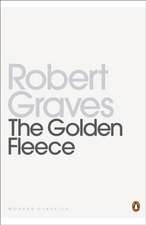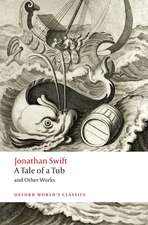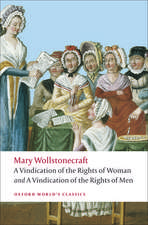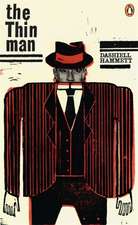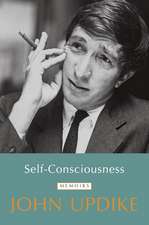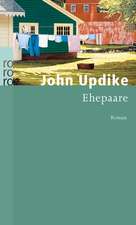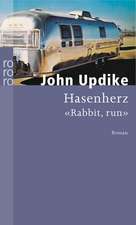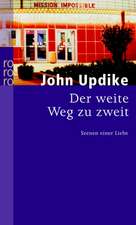Terrorist
Autor John Updikeen Limba Engleză Paperback – 25 iul 2007
| Toate formatele și edițiile | Preț | Express |
|---|---|---|
| Paperback (2) | 53.47 lei 21-33 zile | +19.61 lei 6-12 zile |
| Penguin Books – 25 iul 2007 | 53.47 lei 21-33 zile | +19.61 lei 6-12 zile |
| BALLANTINE BOOKS – 30 apr 2007 | 133.80 lei 6-8 săpt. |
Preț: 53.47 lei
Preț vechi: 63.61 lei
-16% Nou
Puncte Express: 80
Preț estimativ în valută:
10.23€ • 10.68$ • 8.47£
10.23€ • 10.68$ • 8.47£
Carte disponibilă
Livrare economică 14-26 martie
Livrare express 27 februarie-05 martie pentru 29.60 lei
Preluare comenzi: 021 569.72.76
Specificații
ISBN-13: 9780141027845
ISBN-10: 0141027843
Pagini: 320
Dimensiuni: 129 x 198 x 19 mm
Greutate: 0.23 kg
Editura: Penguin Books
Colecția Penguin
Locul publicării:London, United Kingdom
ISBN-10: 0141027843
Pagini: 320
Dimensiuni: 129 x 198 x 19 mm
Greutate: 0.23 kg
Editura: Penguin Books
Colecția Penguin
Locul publicării:London, United Kingdom
Notă biografică
John
Updike
was
born
in
1932
in
Shillington,
Pennsylvania.
He
is
the
author
of
over
fifty
books,
includingThe
Poorhouse
Fair;the
Rabbit
series
(Rabbit,
Run;Rabbit
Redux;Rabbit
Is
Rich;
Rabbit
At
Rest);Marry
Me;The
Witches
of
Eastwick,which
was
made
into
a
major
feature
film;Memories
of
the
Ford
Administration;
Brazil;
In
the
Beauty
of
the
Lilies;Toward
the
End
of
Time;Gertrude
and
Claudius;andSeek
My
Face.He
has
written
a
number
of
collections
of
short
stories,
includingThe
Afterlife
and
Other
StoriesandLicks
of
Love,
which
includes
a
final
Rabbit
story,Rabbit
Remembered.His
essays
and
criticism
first
appeared
in
publications
such
as
theNew
Yorkerand
theNew
York
Review
of
Books,
and
are
now
collected
into
numerous
volumes.Collected
Poems
1953-1993brings
together
almost
all
of
his
verse,
and
a
new
edition
of
hisSelected
Poemsis
forthcoming
from
Hamish
Hamilton.
His novels, stories, and non-fiction collections have won have won the Pulitzer Prize, the National Book Award, the PEN/Faulkner Award, the American Book Award, the National Book Critics Circle Award, the Rosenthal Award and the Howells Medal.
Updike graduated from Harvard College in 1954, and spent a year at Oxford's Ruskin School of Drawing and Fine Art. From 1955 to 1957 he was a member of staff at the New Yorker, and he lived in Massachusetts from 1957 until his death in January 2009.
His novels, stories, and non-fiction collections have won have won the Pulitzer Prize, the National Book Award, the PEN/Faulkner Award, the American Book Award, the National Book Critics Circle Award, the Rosenthal Award and the Howells Medal.
Updike graduated from Harvard College in 1954, and spent a year at Oxford's Ruskin School of Drawing and Fine Art. From 1955 to 1957 he was a member of staff at the New Yorker, and he lived in Massachusetts from 1957 until his death in January 2009.
Extras
I
Devils, Ahmad thinks. These devils seek to take away my God. All day long, at Central High School, girls sway and sneer and expose their soft bodies and alluring hair. Their bare bellies, adorned with shining navel studs and low-down purple tattoos, ask, What else is there to see? Boys strut and saunter along and look dead-eyed, indicating with their edgy killer gestures and careless scornful laughs that this world is all there is—a noisy varnished hall lined with metal lockers and having at its end a blank wall desecrated by graffiti and roller-painted over so often it feels to be coming closer by millimeters.
The teachers, weak Christians and nonobservant Jews, make a show of teaching virtue and righteous self-restraint, but their shifty eyes and hollow voices betray their lack of belief. They are paid to say these things, by the city of New Prospect and the state of New Jersey. They lack true faith; they are not on the Straight Path; they are unclean. Ahmad and the two thousand other students can see them scuttling after school into their cars on the crackling, trash-speckled parking lot like pale crabs or dark ones restored to their shells, and they are men and women like any others, full of lust and fear and infatuation with things that can be bought. Infidels, they think safety lies in accumulation of the things of this world, and in the corrupting diversions of the television set. They are slaves to images, false ones of happiness and affluence. But even true images are sinful imitations of God, who can alone create. Relief at escaping their students unscathed for another day makes the teachers’ chatter of farewell in the halls and on the parking lot too loud, like the rising excitement of drunks. The teachers revel when they are away from the school. Some have the pink lids and bad breaths and puffy bodies of those who habitually drink too much. Some get divorces; some live with others unmarried. Their lives away from the school are disorderly and wanton and self-indulgent. They are paid to instill virtue and democratic values by the state government down in Trenton, and that Satanic government farther down, in Washington, but the values they believe in are
Godless: biology and chemistry and physics. On the facts and formulas of these their false voices firmly rest, ringing out into the classroom. They say that all comes out of merciless blind atoms, which cause the cold weight of iron, the transparency of glass, the stillness of clay, the agitation of flesh. Electrons pour through copper threads and computer gates and the air itself when stirred to lightning by the interaction of water droplets. Only what we can measure and deduce from measurement is true. The rest is the passing dream that we call our selves.
Ahmad is eighteen. This is early April; again green sneaks, seed by seed, into the drab city’s earthy crevices. He looks down from his new height and thinks that to the insects unseen in the grass he would be, if they had a consciousness like his, God. In the year past he has grown three inches, to six feet—more unseen materialist forces, working their will upon him. He will not grow any taller, he thinks, in this life or the next. If there is a next, an inner devil murmurs. What evidence beyond the Prophet’s blazing and divinely inspired words proves that there is a next? Where would it be hidden? Who would forever stoke Hell’s boilers? What infinite source of energy would maintain opulent Eden, feeding its dark-eyed houris, swelling its heavy-hanging fruits, renewing the streams and splashing fountains in which God, as described in the ninth sura of the Qur’an, takes eternal good pleasure? What of the second law of thermodynamics?
The deaths of insects and worms, their bodies so quickly absorbed by earth and weeds and road tar, devilishly strive to tell Ahmad that his own death will be just as small and final. Walking to school, he has noticed a sign, a spiral traced on the pavement in luminous ichor, angelic slime from the body of some low creature, a worm or snail of which only this trace remains. Where was the creature going, its path spiralling inward to no purpose? If it was seeking to remove itself from the hot sidewalk that was roasting it to death as the burning sun beat down, it failed and moved in fatal circles. But no little worm-body was left at the spiral’s center.
So where did that body fly to? Perhaps it was snatched up by God and taken straight to Heaven. Ahmad’s teacher, Shaikh Rashid, the imam at the mosque upstairs at 27811?2 West Main Street, tells him that according to the sacred tradition of the Hadith such things happen:
the Messenger, riding the winged white horse Buraq, was guided through the seven heavens by the angel Gabriel to a certain place, where he prayed with Jesus, Moses, and Abraham before returning to Earth, to become the last of the prophets, the ultimate one. His adventures that day are proved by the hoofprint, sharp and clear, that Buraq left on the Rock beneath the sacred Dome in the center of Al-Quds, called Jerusalem by the infidels and Zionists, whose torments in the furnaces of Jahannan are well described in the seventh and eleventh and fiftieth of the suras of the Book of Books.
Shaikh Rashid recites with great beauty of pronunciation the one hundred fourth sura, concerning Hutama, the Crushing Fire:
And who shall teach thee what the Crushing Fire is?
It is God’s kindled fire,
Which shall mount above the hearts of the damned;
It shall verily rise over them like a vault,
On outstretched columns.
When Ahmad seeks to extract from the images in the Qur’an’s Arabic—the outstretched columns, fi 'amadin mumaddada, and the vault high above the hearts of those huddled in terror and straining to see into the towering mist of white heat, naru l-lahi l-muqada—some hint of the Merciful’s relenting at some point in time, and calling a halt to Hutama, the imam casts down his eyes, which are an unexpectedly pale gray, as milky and elusive as a kafir woman’s, and says that these visionary descriptions by the Prophet are figurative. They are truly about the burning misery of separation from God and the scorching of our remorse for our sins against His commands. But Ahmad does not like Shaikh Rashid’s voice when he says this. It reminds him of the unconvincing voices of his teachers at Central High. He hears Satan’s undertone in it, a denying voice within an affirming voice. The Prophet meant physical fire when he preached unforgiving fire; Mohammed could not proclaim the fact of eternal fire too often.
Shaikh Rashid is not much older than Ahmad—perhaps ten years, perhaps twenty. He has few wrinkles in the white skin of his face. He is diffident though precise in his movements. In the years by which he is older, the world has weakened him. When the murmuring of the devils gnawing within him tinges the imam’s voice, Ahmad feels in his own self a desire to rise up and crush him, as God roasted that poor worm at the center of the spiral. The student’s faith exceeds the master’s; it frightens Shaikh Rashid to be riding the winged white steed of Islam, its irresistible onrushing. He seeks to soften the Prophet’s words, to make them blend with human reason, but they were not meant to blend: they invade our human softness like a sword. Allah is sublime beyond all particulars. There is no God but He, the Living, the Self-Subsistent; He is the light by which the sun looks black. He does not blend with our reason but makes our reason bow low, its forehead scraping the dust and bearing like Cain the mark of that dust. Mohammed was a mortal man but visited Paradise and consorted with the realities there. Our deeds and thoughts were written in the Prophet’s consciousness in letters of gold, like the burning words of electrons that a computer creates of pixels as we tap the keyboard.
The halls of the high school smell of perfume and bodily exhalations, of chewing gum and impure cafeteria food, and of cloth–cotton and wool and the synthetic materials of running shoes, warmed by young flesh. Between classes there is a thunder of movement; the noise is stretched thin over a violence beneath, barely restrained. Sometimes in the lull at the end of the school day, when the triumphant, jeering racket of departure has subsided and only the students doing extracurricular activities remain in the great building, Joryleen Grant comes up to Ahmad at his locker. He does track in the spring; she sings in the girls’ glee club. As students go at Central High, they are “good.” His religion keeps him from drugs and vice, though it also holds him rather aloof from his classmates and the studies on the curriculum. She is short and round and talks well in class, pleasing the teacher. There is an endearing self-confidence in how compactly her cocoa-brown roundnesses fill her clothes, which today are patched and sequinned jeans, worn pale where she sits, and a ribbed magenta shorty top both lower and higher than it should be. Blue plastic barrettes pull her glistening hair back as straight as it will go; the plump edge of her right ear holds along its crimp a row of little silver rings. She sings in assembly programs, songs of Jesus or sexual longing, both topics abhorrent to Ahmad. Yet he is pleased that she notices him, coming up to him now and then like a tongue testing a sensitive tooth.
“Cheer up, Ahmad,” she teases him. “Things can’t be so bad.” She rolls her half-bare shoulder, lifting it as if to shrug, to show she is being playful.
“They’re not bad,” he says. “I’m not sad,” he tells her. His long body tingles under his clothes—white shirt, narrow-legged black jeans—from the shower after track practice.
“You’re looking way serious,” she tells him. “You should learn to smile more.”
“Why? Why should I, Joryleen?”
“People will like you more.”
“I don’t care about that. I don’t want to be liked.”
From the Hardcover edition.
Devils, Ahmad thinks. These devils seek to take away my God. All day long, at Central High School, girls sway and sneer and expose their soft bodies and alluring hair. Their bare bellies, adorned with shining navel studs and low-down purple tattoos, ask, What else is there to see? Boys strut and saunter along and look dead-eyed, indicating with their edgy killer gestures and careless scornful laughs that this world is all there is—a noisy varnished hall lined with metal lockers and having at its end a blank wall desecrated by graffiti and roller-painted over so often it feels to be coming closer by millimeters.
The teachers, weak Christians and nonobservant Jews, make a show of teaching virtue and righteous self-restraint, but their shifty eyes and hollow voices betray their lack of belief. They are paid to say these things, by the city of New Prospect and the state of New Jersey. They lack true faith; they are not on the Straight Path; they are unclean. Ahmad and the two thousand other students can see them scuttling after school into their cars on the crackling, trash-speckled parking lot like pale crabs or dark ones restored to their shells, and they are men and women like any others, full of lust and fear and infatuation with things that can be bought. Infidels, they think safety lies in accumulation of the things of this world, and in the corrupting diversions of the television set. They are slaves to images, false ones of happiness and affluence. But even true images are sinful imitations of God, who can alone create. Relief at escaping their students unscathed for another day makes the teachers’ chatter of farewell in the halls and on the parking lot too loud, like the rising excitement of drunks. The teachers revel when they are away from the school. Some have the pink lids and bad breaths and puffy bodies of those who habitually drink too much. Some get divorces; some live with others unmarried. Their lives away from the school are disorderly and wanton and self-indulgent. They are paid to instill virtue and democratic values by the state government down in Trenton, and that Satanic government farther down, in Washington, but the values they believe in are
Godless: biology and chemistry and physics. On the facts and formulas of these their false voices firmly rest, ringing out into the classroom. They say that all comes out of merciless blind atoms, which cause the cold weight of iron, the transparency of glass, the stillness of clay, the agitation of flesh. Electrons pour through copper threads and computer gates and the air itself when stirred to lightning by the interaction of water droplets. Only what we can measure and deduce from measurement is true. The rest is the passing dream that we call our selves.
Ahmad is eighteen. This is early April; again green sneaks, seed by seed, into the drab city’s earthy crevices. He looks down from his new height and thinks that to the insects unseen in the grass he would be, if they had a consciousness like his, God. In the year past he has grown three inches, to six feet—more unseen materialist forces, working their will upon him. He will not grow any taller, he thinks, in this life or the next. If there is a next, an inner devil murmurs. What evidence beyond the Prophet’s blazing and divinely inspired words proves that there is a next? Where would it be hidden? Who would forever stoke Hell’s boilers? What infinite source of energy would maintain opulent Eden, feeding its dark-eyed houris, swelling its heavy-hanging fruits, renewing the streams and splashing fountains in which God, as described in the ninth sura of the Qur’an, takes eternal good pleasure? What of the second law of thermodynamics?
The deaths of insects and worms, their bodies so quickly absorbed by earth and weeds and road tar, devilishly strive to tell Ahmad that his own death will be just as small and final. Walking to school, he has noticed a sign, a spiral traced on the pavement in luminous ichor, angelic slime from the body of some low creature, a worm or snail of which only this trace remains. Where was the creature going, its path spiralling inward to no purpose? If it was seeking to remove itself from the hot sidewalk that was roasting it to death as the burning sun beat down, it failed and moved in fatal circles. But no little worm-body was left at the spiral’s center.
So where did that body fly to? Perhaps it was snatched up by God and taken straight to Heaven. Ahmad’s teacher, Shaikh Rashid, the imam at the mosque upstairs at 27811?2 West Main Street, tells him that according to the sacred tradition of the Hadith such things happen:
the Messenger, riding the winged white horse Buraq, was guided through the seven heavens by the angel Gabriel to a certain place, where he prayed with Jesus, Moses, and Abraham before returning to Earth, to become the last of the prophets, the ultimate one. His adventures that day are proved by the hoofprint, sharp and clear, that Buraq left on the Rock beneath the sacred Dome in the center of Al-Quds, called Jerusalem by the infidels and Zionists, whose torments in the furnaces of Jahannan are well described in the seventh and eleventh and fiftieth of the suras of the Book of Books.
Shaikh Rashid recites with great beauty of pronunciation the one hundred fourth sura, concerning Hutama, the Crushing Fire:
And who shall teach thee what the Crushing Fire is?
It is God’s kindled fire,
Which shall mount above the hearts of the damned;
It shall verily rise over them like a vault,
On outstretched columns.
When Ahmad seeks to extract from the images in the Qur’an’s Arabic—the outstretched columns, fi 'amadin mumaddada, and the vault high above the hearts of those huddled in terror and straining to see into the towering mist of white heat, naru l-lahi l-muqada—some hint of the Merciful’s relenting at some point in time, and calling a halt to Hutama, the imam casts down his eyes, which are an unexpectedly pale gray, as milky and elusive as a kafir woman’s, and says that these visionary descriptions by the Prophet are figurative. They are truly about the burning misery of separation from God and the scorching of our remorse for our sins against His commands. But Ahmad does not like Shaikh Rashid’s voice when he says this. It reminds him of the unconvincing voices of his teachers at Central High. He hears Satan’s undertone in it, a denying voice within an affirming voice. The Prophet meant physical fire when he preached unforgiving fire; Mohammed could not proclaim the fact of eternal fire too often.
Shaikh Rashid is not much older than Ahmad—perhaps ten years, perhaps twenty. He has few wrinkles in the white skin of his face. He is diffident though precise in his movements. In the years by which he is older, the world has weakened him. When the murmuring of the devils gnawing within him tinges the imam’s voice, Ahmad feels in his own self a desire to rise up and crush him, as God roasted that poor worm at the center of the spiral. The student’s faith exceeds the master’s; it frightens Shaikh Rashid to be riding the winged white steed of Islam, its irresistible onrushing. He seeks to soften the Prophet’s words, to make them blend with human reason, but they were not meant to blend: they invade our human softness like a sword. Allah is sublime beyond all particulars. There is no God but He, the Living, the Self-Subsistent; He is the light by which the sun looks black. He does not blend with our reason but makes our reason bow low, its forehead scraping the dust and bearing like Cain the mark of that dust. Mohammed was a mortal man but visited Paradise and consorted with the realities there. Our deeds and thoughts were written in the Prophet’s consciousness in letters of gold, like the burning words of electrons that a computer creates of pixels as we tap the keyboard.
The halls of the high school smell of perfume and bodily exhalations, of chewing gum and impure cafeteria food, and of cloth–cotton and wool and the synthetic materials of running shoes, warmed by young flesh. Between classes there is a thunder of movement; the noise is stretched thin over a violence beneath, barely restrained. Sometimes in the lull at the end of the school day, when the triumphant, jeering racket of departure has subsided and only the students doing extracurricular activities remain in the great building, Joryleen Grant comes up to Ahmad at his locker. He does track in the spring; she sings in the girls’ glee club. As students go at Central High, they are “good.” His religion keeps him from drugs and vice, though it also holds him rather aloof from his classmates and the studies on the curriculum. She is short and round and talks well in class, pleasing the teacher. There is an endearing self-confidence in how compactly her cocoa-brown roundnesses fill her clothes, which today are patched and sequinned jeans, worn pale where she sits, and a ribbed magenta shorty top both lower and higher than it should be. Blue plastic barrettes pull her glistening hair back as straight as it will go; the plump edge of her right ear holds along its crimp a row of little silver rings. She sings in assembly programs, songs of Jesus or sexual longing, both topics abhorrent to Ahmad. Yet he is pleased that she notices him, coming up to him now and then like a tongue testing a sensitive tooth.
“Cheer up, Ahmad,” she teases him. “Things can’t be so bad.” She rolls her half-bare shoulder, lifting it as if to shrug, to show she is being playful.
“They’re not bad,” he says. “I’m not sad,” he tells her. His long body tingles under his clothes—white shirt, narrow-legged black jeans—from the shower after track practice.
“You’re looking way serious,” she tells him. “You should learn to smile more.”
“Why? Why should I, Joryleen?”
“People will like you more.”
“I don’t care about that. I don’t want to be liked.”
From the Hardcover edition.
Recenzii
“Terrorist leaves the reader ripping through the book to its finale, desperate to find out what happens. . . . [A] compelling and surprising ride.”—USA Today
“A chilling tale that is perhaps the most essential novel to emerge from September 11.”—People (Critic’s Choice)
“Riveting . . . emotionally daring . . . Updike’s ability to get inside the mind of his Ahmad . . . is what renders the novel credible and sometimes wrenching in its authenticity.”—The Boston Globe
“A chilling tale that is perhaps the most essential novel to emerge from September 11.”—People (Critic’s Choice)
“Riveting . . . emotionally daring . . . Updike’s ability to get inside the mind of his Ahmad . . . is what renders the novel credible and sometimes wrenching in its authenticity.”—The Boston Globe





